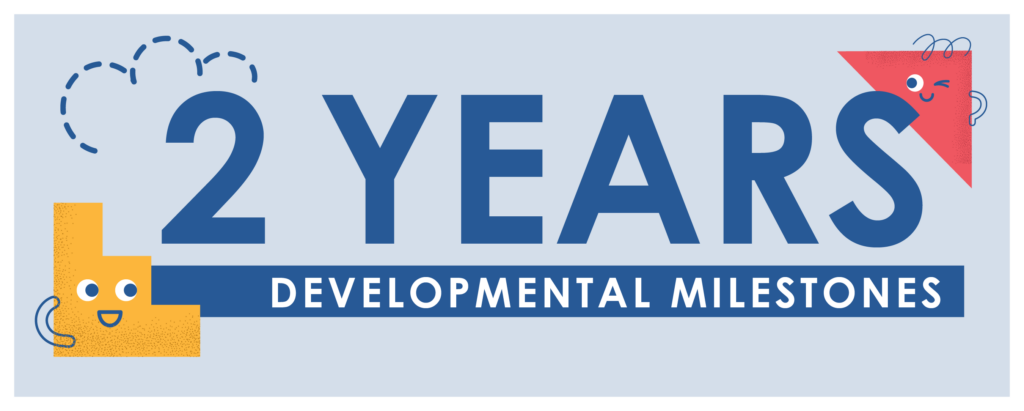
The way your child learns, plays, and acts shows you important steps in development. All children grow and develop at their own rate. However, most follow a predictable skill path along the way. These skill paths are called developmental milestones; skills that most children can perform by a certain age. Refer to the checklist below to determine what milestones your child has completed by two years of age.
By two years most children:
Fine Motor (skills that require balance and movement of small muscle groups)
_ Turn the pages of a cardboard book independently.
_ Use a turning motion with their wrist when attempting to turn a door knob, wind up a toy, or twist tops.
_ Stack at least six blocks without the tower falling.
_ Complete a three piece shape puzzle (circle, square, triangle).
Cognitive (memory, problem solving, thinking, and overall play)
_ Imitate a model from memory such as feeding a baby doll.
_ Begin to sort shapes and colors.
_ Play simple pretend games.
_ Find items that have been hidden under two or three cloths.
_ Complete sentences and rhymes in familiar books.
Communication
_ Say words overheard in conversation.
_ Follow directions consistently.
_ Point to pictures in a book when they are named.
_ Correctly name at least one picture when asked “What’s this?”
_ Put two words together independently such as “drink milk” or “car fall.”
Social-Emotional
_ Copy activities adults do (sweeping, wiping up a spill, shaving, combing their hair).
_ Begin to become more independent “I can do it.”
_ Play mainly next to other children, but are starting to play with other children, such as in chase games.
Gross Motor
_ Attempt to kick a ball by walking into it or kicks a ball by swinging their leg forward.
_ Walk up and down the stairs independently (can hold on to the railing or wall).
_ Run well and stop without falling or bumping into things.
_ Jump in place with both feet leaving the floor.
Self-Care
_ Begin to feed themselves with a fork.
_ Feed themselves with a spoon without spilling.
_ Begin to be exposed to potty training.
_ Pull off simple clothing such as shoes or pants.
_ Pull a zipper up and down that has already been started.
_ Undress themselves.
Talk to your doctor or contact an early intervention program in your community if you notice any of the following signs of a possible developmental delay in your child at two years of age.
_ Doesn’t know what to do with common objects such as a brush, phone, spoon, or cup.
_ Doesn’t copy actions or words.
_ Doesn’t follow simple directions.
_ Loss of skills.
_ Drools or has very unclear speech.
ASQ. Ages and Stages Questionnaires, Third Edition (ASQ – 3)
CDD. Centers for Disease Control <www.cdc.gov>
D’Eugenio, Diane and Rogers, Sally J. Early Intervention Developmental Profile (EIDP). 1981. University of Michigan.


Leave a Reply